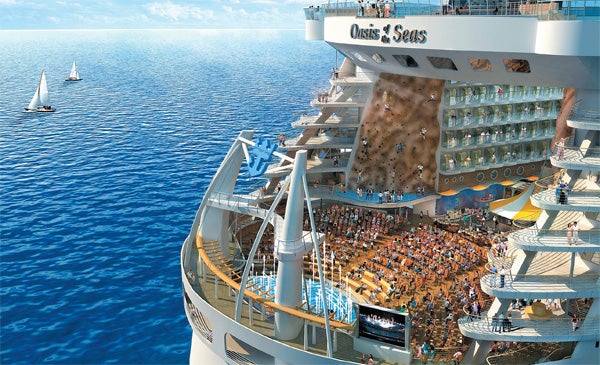Cruise staff
The continuing success of the cruise industry makes it a fantastic training ground for the managers of tomorrow

Working on a cruise ship is a great way to kick-start a management career, with the opportunity to focus on providing great customer experiences on board the world's most sophisticated and technologically advanced floating resorts. There are few other areas of employment where managers experience the scale of cruising and the challenges of working as part of an integrated, multicultural team or, indeed, where the results of hard work are so visible.
The cruise industry is a modern-day success story. It has had year-on-year growth since the Eighties and, over the next three years, 41 new cruise ships will be launched creating the demand for an additional 32,000 crew. Royal Caribbean's Oasis of the Seas, the largest ship in the industry, is scheduled to undertake her maiden voyage in December 2009. Carnival Corporation is the world's largest cruise company, with headquarters in Miami and London and a fleet of 88 ships, with another 18 ships due to be constructed by 2012. The company employs more than 80,000 people and operates 11 brands targeting different markets across the world.
The success of cruises has emerged as a result of operating in a changing world where opportunities are global and new markets are constantly emerging. The industry is remarkably flexible. It takes five years to build a ship, but only three weeks to rebrand it. Financial downturns are less likely to cause long-term problems because the industry encourages early booking and ships can be switched relatively quickly to modify capacity if demand decreases. Over the last four years, growth in Europe has outpaced the United States; this pattern creates even more opportunities for budding managers from the UK, because cruise passengers like to see the brand represented by the managers and officers on board.
In the UK, Carnival Corporation is by far the largest employer, operating well-known brands such as P&O Cruises, Ocean Village, Cunard, Yachts of Seabourn and Princess Cruises. It hasn't always been easy to find out about maritime management opportunities because the scale of growth has created tremendous pressure on cruise companies' abilities to source staff. Many companies make use of recruitment agents such as Viking Recruitment to source all types of officers. However, routes for securing quality jobs are becoming available through universities and colleges, who are networking with employers.
Most employees onboard a cruise ship are, essentially, hotel staff. For instance, the executive purser, or passenger services director, is the equivalent to a hotel's general manager. This person leads a small team of directors who look after food and beverage provision, other passenger services and accommodation operations. They in turn would delegate responsibility to operational managers. Cruise ships generate income from a number of different sources, including bar sales, shore excursions, casinos and on-board shops. These positions all need to be managed and administered, as do the kitchen and restaurants, customer services, the personnel onboard, special services (such as weddings), immigration and border controls, and finance and accounting.
The entry-level position for new managers is junior assistant purser or assistant manager and the types of jobs available can vary depending on the ship and the cruise brand. Officers are expected to work onboard for a number of months and the hours can be long.
Many people are put off by the idea of working every day on such a long contract, but there are serious advantages. Time off occurs at the end of the contract: usually two months after having worked four to six months. Crew usually get time off to see most ports of call and the social bond among the workers onboard is very strong. Pay is usually tax-free, depending on local regulations and time spent out of the country. Working on a cruise ship means you won't be asking colleagues what's on television during your lunch break; instead, you'll be discussing what to do in Barbados for the afternoon.
Philip Gibson is a senior lecturer in hospitality management at the University of Plymouth, www.plymouth.ac.uk
Join our commenting forum
Join thought-provoking conversations, follow other Independent readers and see their replies
Comments